
Non-Stop flies into cinemas this weekend. The film sees Liam Neeson pitted against time to save people on a plane whilst also being framed for the hi-jacking. The true villain teases Neeson through his secure network on a mobile phone. To celebrate this cellular stalking, we look at other movies that have phone based villains!
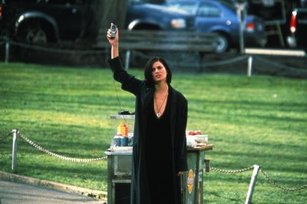
In early 2003, there were actually two films released that followed a very similar premise: a person being held hostage in public over the telephone by a hidden sniper. One was Joel Schumacher’s Phone Booth; the other was Kari Skogland’s Liberty Stands Still, starring Linda Fiorentino and Wesley Snipes. Amongst the differences between the two films, the biggest by far was Liberty Stands Still’s very direct and critical stance with regard to the Second Amendment of the US Constitution – the right to bear arms. It’s a highly controversial part of US law, and seems to become more so with each passing year. And Skogland’s film chose to tackle it head on.
Liberty Stands Still tells the story of Liberty Wallace (Fiorentino), employee of one of the largest gun manufacturers in the country, who receives a call on her mobile from Joe (Snipes), a gunman hidden somewhere in one of the surrounding buildings. Joe instructs Liberty to chain herself to a nearby hotdog cart or he’ll shoot her. A few random shots to make a point, and Liberty does as instructed. What follows is half-thriller and half-political debate, centred around the notion that the ready availability of guns within the United States is an inherently bad and dangerous thing.
It’s actually kind of an intriguing idea, and both Fiorentino and Snipes give good central performances. Plus, the fact that it came out so soon after the Beltway sniper attacks in the US would seem to make it the most timely movie of the moment. However, the overall effect is rather dulled by the over-bearing didacticism and lunk-headed nature of the Skogland’s script. Despite the villain’s (literal) call for an open debate on the issue of gun control, it’s so very clearly coming from a liberal perspective that all the film will do is preach to the choir, whilst simultaneously enraging those on the other side with whom it should be trying to engage. Suffice to say, the gun-rights supporters decried the movie, and critics were none to impressed either. Combine these points with a straight-to-DVD release date close to that of a better, similarly-themed film, Liberty Stands Still never really had a chance.
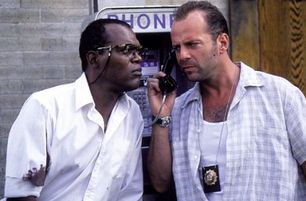
Die Hard with a Vengeance is the third film in the (sadly) ongoing Die Hard franchise, this time locating the action on Lieutenant John McClane’s home turf: New York City. In this instalment, McClane must take on the disembodied voice on the other end of the phone, who is claiming responsibility for a massive explosion earlier and is threatening to cause another unless his demands are met. We know him only as “Simon” and he is pretty much the height of telephone-based movie villainy.
What makes “Simon” such a bastard is that, in the beginning, his attacks seem entirely centred on putting McClane through the wringer, forcing everyone to play his game lest he repeat his attack on the city. He makes McClane pair up with a Harlem shop owner and then has them run all over the city chasing trains and answering phones, all whilst causing mass panic by claiming he’s paced a bomb in a school. Chaos ensues. You may even think he’s just a highly organised, immensely destructive pest, but to do so would be to fall for his trap. As the film progresses, we will come to learn more about “Simon” and what his true intentions are, both in regard to his citywide destruction and his personal vendetta against McClane.
As a movie villain, “Simon” is actually a better version of the Riddler than the one we got in Batman Forever. Like the Riddler, “Simon” uses games and puzzles to simultaneously bamboozle, distract and punish the police force, not to mention just simply showing off how much smarter he is than everyone else. He’s smart, arrogant, immensely capable, fiercely motivated and he literally brings the entire city to a complete terror-filled wreck, and he does it all with a couple of bombs and a few phone calls.
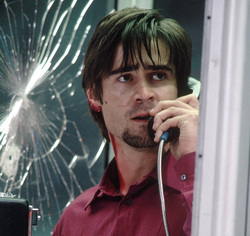
Most thrillers work well because you can see the villain and connect with them. You have a physical entity you can see and you know from how they move and express themselves what to expect from them. So what happens when you remove the physical element of a villain and just have them as a voice? When you take away the traditional element of an actual antagonist you can see and interact with and just have them as this disembodied aspect of the film?
The 2002 film Phonebooth takes this idea and runs with it, rather successfully I feel. For those that haven’t seen it, the plot concerns a New York publicist, played by Colin Farrell who finds himself trapped in a phonebooth after answering a seemingly normal ringing phone. It transpires that the man on the other end is not happy with the way that Farrell’s character, Stuart Shepard, is living his life and wants him to make a choice on how he is going to carry on the rest of his days; although if he doesn’t follow the instructions of the anonymous caller may not be for much longer.
The film, which was directed by Joel Schumacher, manages to build up an incredible amount of tension, for what basically is a man talking into a phone for the vast majority of the film. As neither Stuart nor the audience can actually see where the caller is situated both are dropped into a world of paranoia as they try to work out not just the reasoning behind the call, but also where the sniper could be located.
On paper the premise of Phonebooth could seem quite a boring one; a man standing in a box talking into a phone and trying not to get shot for just under an hour and half. However, as audiences are used to seeing their antagonists and seeing how they interact with the hero, although I doubt you could really call Stuart Shepard the hero of this narrative, it is a breath of fresh air to see a character having to fight against an unknown entity. It makes it all the sweeter at the end, when the only glimpse we are actually given of the villain is the shot of hand and the sweeping of a coat. Even in the closing of the film, when we are usually given a complete amount of closer to the story do we not even get that. This is one villain who remains truly anonymous throughout the story.
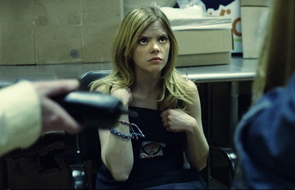
The scariest thing about Compliance is that it actually happened. Based on the strip search phone prank scam that ran over ten years, Compliance details how human beings blindly follow the orders of authority in a way that makes the famous psychologist Milgram’s study on the subject seem tame. The film details only one of the attacks, in which the manager of a fast food restaurant receives a phone call from a “police officer” claiming that one of her employees has stolen a customer’s purse. Using deception and mind games, Officer Daniels convinces the manager Sandra (played by the excellent Ann Dowd) that employee Becky (Dreama Walker) is the culprit. What follows is a harrowing and claustrophobic sequence of events, as Becky is forced to strip naked and be searched by Sandra on the orders of the officer. Later, when Sandra has to return to managing her store, she thinks very little of leaving her fiancé, Van, to watch over the naked and vulnerable Becky. Van is even more compliant than Sandra, eventually leading to him committing an awful sexual assault on the orders of Officer Daniels. Becky is only rescued from her ordeal when custodian Harold refuses to comply and the real police are alerted.
Everything that happens in Compliance is a fact of the Bullitt County McDonald’s case, just one of the scams, and it is this truth that makes “Officer Daniels” such an intimidating villain. He is able to manipulate ordinary human beings to commit evil with just the appearance of authority, and this is brought to life by Pat Healy’s fantastic voice work, at once respectable to Sandra and the other characters in the film, and sinister to the audience. The film, and the real life case, have much to say on the nature of compliance in humans, from the Nazis who were “just following orders” to the participants in Milgram’s famous experiment where participants were convinced to deliver (thankfully fake) fatal electric shocks to others on the order of a man in a lab coat. It is horrific to see that, as humans, we can be so easily manipulated, and that horror is what makes Officer Daniels one of the great Phone Call Villains.
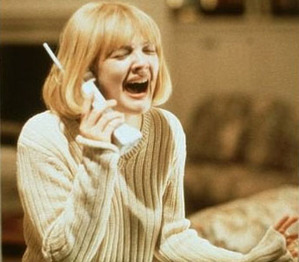
Possibly one of the most famous phone based villains of all time that uses the device in order to alert victims of their presence as well as mock and taunt. Scream was a nineties phenomena that started off as a spoof of the slasher genre and in itself became a brilliant thriller despite spawning of several sequels and the ridiculous Scary Movie ones. The whole concept seems a little bit boring now, what with the entire society bored of slasher movie that see a heap of teenagers fall victim to a rusty blade. The difference here is that Scream is one of the few that is smart enough to be self aware and turns the entire genre on it's head much to the glee of people already bored (and hey, this was the mid nineties)
Scream revolved around a bunch of teenages in small town America (Westborough,) who start being murdered by a masked killer (the now infamous ghost face.) Plunging the entire population into hysteria it soon becomes apparent that the killings revolve around Sidney Prescott and her troubled family past. With accusations to the killers identity, Sidney will find that the identity of the perpetrator (or perpetrators) is closer to home than she'd like to admit and unlocking the memories of her mothers own murder would help solve the crime. With the likes of Neve Campbell, Liev Schrieber and Courtney Cox running around, screaming and covered in . The epic Scream series kicked off with Drew Barrymore (a successful attempt to re-start her career) being phoned by a mysterious voice, pretending to be a wrong number. What follows is a discussion of scary movies only to find that the person is threatening to not just kill her, but also her boyfriend if she gets her questions wrong, uttering the famous line "do you like scary movies?" The phone is often used by the killer to lure or provoke his victims before cutting them up.
Not without controversy, Scream apparently spawned off copy cat killings and increased the debate around violence in the movies. But pushing that aside, Scream is still a movie that has one of the most enigmatic killers and reasons behind killing that will make you fear your film obsessed friend (that also has nothing to do with cinemas and film violence creating killers, by the way). Nope, not even us. *shifty eyes*
Maybe it's best to let that call go to voice mail...
Non-Stop is in cinemas now! Read our review here

 RSS Feed
RSS Feed
